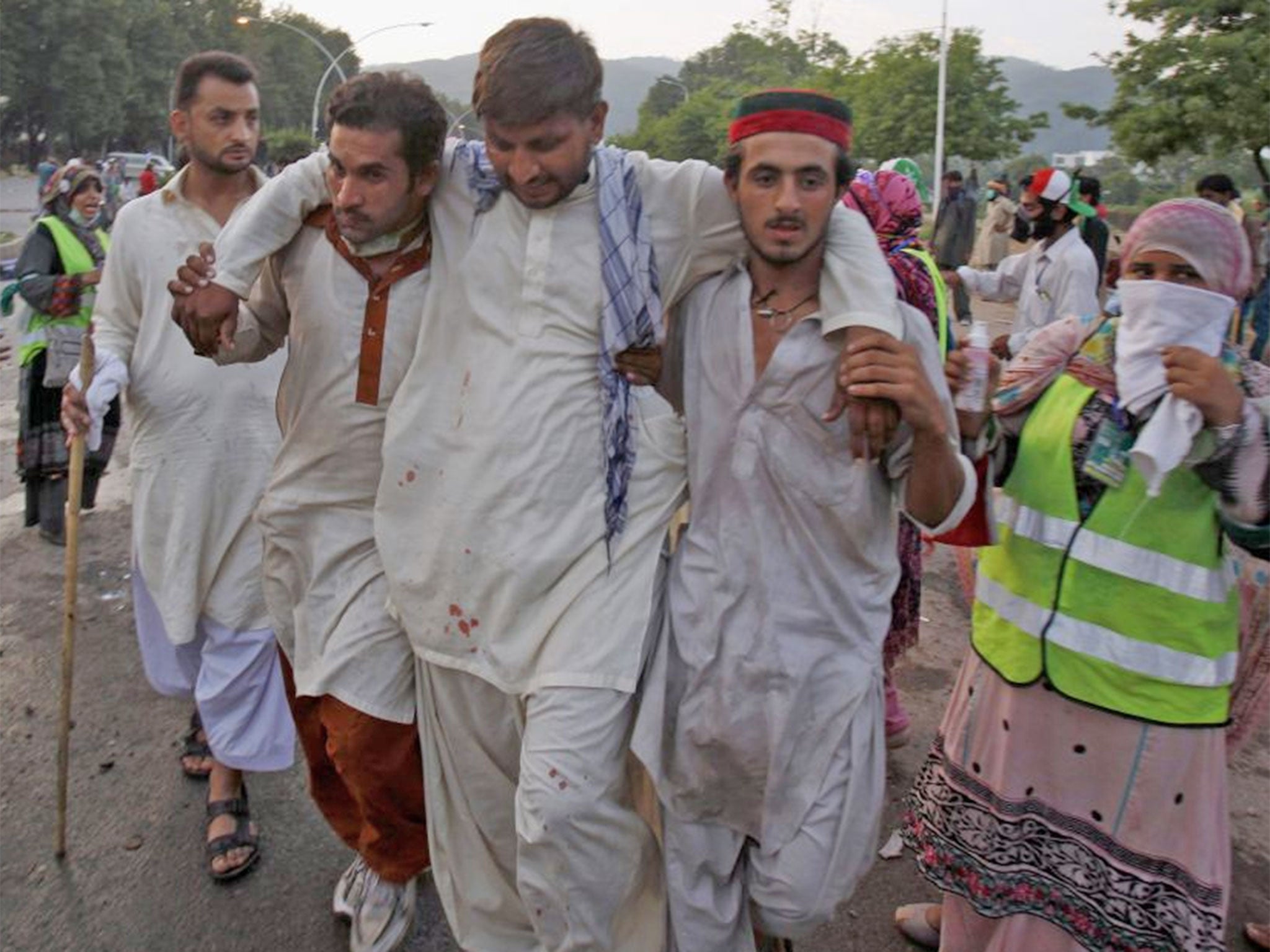Pakistan PM Nawaz Sharif convenes parliament after three die in protests against him in weekend of violence
The clashes left at least three dead and hundreds injured

Your support helps us to tell the story
From reproductive rights to climate change to Big Tech, The Independent is on the ground when the story is developing. Whether it's investigating the financials of Elon Musk's pro-Trump PAC or producing our latest documentary, 'The A Word', which shines a light on the American women fighting for reproductive rights, we know how important it is to parse out the facts from the messaging.
At such a critical moment in US history, we need reporters on the ground. Your donation allows us to keep sending journalists to speak to both sides of the story.
The Independent is trusted by Americans across the entire political spectrum. And unlike many other quality news outlets, we choose not to lock Americans out of our reporting and analysis with paywalls. We believe quality journalism should be available to everyone, paid for by those who can afford it.
Your support makes all the difference.Pakistan’s Prime Minister Nawaz Sharif has said he will call a parliamentary session on Tuesday over mass protests in Islamabad, after clashes in the capital that left three people dead and hundreds injured.
The head of Pakistan’s armed forces met senior commanders on Sunday night, with news of the meeting sparking speculation the military was taking a more central role in the stand-off between protesters and the government that has seen parts of Islamabad brought to a halt for two and a half weeks. But in a brief statement, the army said the crisis had to be solved politically and that “further use of force will only aggravate the problem”.
Protesters clashed with police over the weekend, as the demonstrators tried to march on the Prime Minister Nawaz Sharif’s official residence. Police responded by firing tear gas and hitting protesters will bamboo sticks.
Officials confirmed that three people had been killed and hundreds needed treatment.
Mr Sharif, following a meeting with advisers, issued a statement on Sunday stating he would convene a joint session of parliament.
The 20,000 or so demonstrators who have besieged Islamabad are part of two different protest groups. One is led by cricketer-turned-politician Imran Khan, who has claimed last year’s election which Mr Sharif won handsomely was rigged. The other group is lead by a Muslim cleric who usually lives in Canada, Tahir ul-Qadri, who also claims Mr Sharif is corrupt.
“I am prepared to die here. I have learnt that government plans a major crackdown against us tonight,” Mr Khan said on Sunday evening, according to the Reuters news agency. “I am here till my last breath. The way you stood up last night, you have to stand up today also. We will face them and make them run away this time.”
The protesters have been holding noisy demonstrations since they assembled in Islamabad in August. Mr Sharif’s government initially sought to avoid triggering violence by allowing the protesters to make their way to the very heart of the city where they have been camping out next to government offices.
But when the protesters tried on Saturday evening to make their way to the Prime Minister’s house, police used tear gas and batons to repel them. Many protesters were also armed with sticks and sling shots. Medical officials confirmed that three people had been killed and up to 200 required treatment, most of them having inhaled tear gas.
Mr Sharif was elected to his third term as Prime Minister in an general election held in May 2013, with Mr Khan’s Pakistan Tehreek-e-Insaf (PTI) party coming second in many major cities. Mr Khan accepted the results of the election but called for a probe into alleged vote rigging.
He launched his so-called freedom protest after claiming the government and the election commission had failed to follow up on its agreement to launch an inquiry.
While Mr Khan claims his supporters are acting within their constitutional rights, he has also faced criticism and accusations from Mr Sharif and others that he has allowed his ego to put himself before what is good for the country.
On Sunday, Mr Khan also faced claims from his own senior party members that he had allowed the protesters to go too far. Veteran Pakistani politician Javed Hashmi claimed the party had agreed protesters would not march on the Prime Minister’s house but that Mr Khan had overturned that decision.
“No distance has been left between martial law and us,” said Mr Hashmi, who said he could not support the protesters marching to the Prime Minister’s home.
He claimed that Mr Khan had made the decision after another senior PTI member, Shaikh Raheed, “brought a message [from] someone”.
Mr Sharif has insisted he will not stand down and has accepted the protesters’ demands for a court-appointed inquiry of a number of disputed constituencies.
Yet the protesters have certainly triggered a major crisis for him. Mr Sharif, who was ousted in a military coup in 1999, has long had a difficult relationship with the military. That has not been helped by his decision to allow the prosecution of former army chief Pervez Musharraf – the man who ousted him 15 years ago – to proceed.
The move to charge Mr Musharraf with treason has displeased many within the military and created antagonism between the senior command of the armed forces and the civilian government.
Last week, it was announced that Gen Sharif – no relation to the Prime Minister – had been asked to play a “facilitative role” to try and end the stand-off. Analysts say while the army may not be planning a coup, its taking off a more central role in political events could weaken the civilian government.
Join our commenting forum
Join thought-provoking conversations, follow other Independent readers and see their replies
Comments